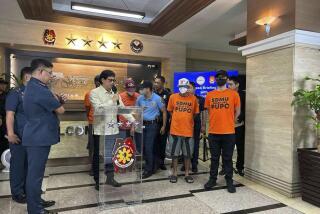N. Korea Offers More Details on Kidnappings
TOKYO — At least two special North Korean agencies were responsible for kidnapping 13 Japanese--one more than previously acknowledged--during the 1970s and ‘80s to provide language training and identities for spies, officials in the Communist nation have told a team of Japanese diplomats.
The disclosure by Japanese officials Wednesday came as doubts mounted about the details North Korea has provided concerning how eight of the victims died, most in their 20s and 30s.
Megumi Yokota, abducted at age 13, hanged herself from a pine tree at 28 after being hospitalized for severe depression, the diplomats were told. Two victims died of carbon monoxide poisoning, two were killed in traffic accidents, one drowned, and two died of heart disease or cirrhosis.
All but one of their graves washed away in floods, North Korea maintains.
The Japanese said the newly identified kidnap victim, Hitomi Soga, is alive and married to a former U.S. soldier living in North Korea. The American--identified as Charles Robert Jenkins, now 62, of North Carolina--defected in 1965 from his post in South Korea.
In Washington, Lt. Col. Thomas Erstfeld of the Pentagon’s POW/Missing Personnel office confirmed that Jenkins defected to North Korea as an Army sergeant, the highest-ranking of six defectors to the country in the 1960s. Two defectors have since died. Erstfeld said he did not know Jenkins’ hometown or unit.
Erstfeld said the Pentagon has made numerous requests for contact with the defectors but that North Korea has always declined.
North Korean leader Kim Jong Il first alluded to the purpose of the kidnappings in his surprise acknowledgment and apology to Japanese Prime Minister Junichiro Koizumi at their meeting two weeks ago. But because so few details were provided, Tokyo sent officials from the Foreign Ministry to Pyongyang, the North’s capital, for four days this week to find out more.
North Korea said nine of the 13 victims were abducted between 1977 and 1980 by agents working for a special agency that provided Japanese-language training and identities stolen from the victims to help spies more easily infiltrate South Korea.
Members of another department kidnapped Japanese in Europe from 1980 to 1983 because “they didn’t have their own contacts” to carry out abductions in Japan, Japanese Deputy Cabinet Secretary Shinzo Abe said.
The Japanese officials were told that two senior North Korean officials responsible for the kidnappings were tried in 1998. One was put to death and the other sentenced to 15 years in prison.
The North Koreans said seven of the victims were abducted by agents and one by an unidentified intermediary. The other five were lured to the North with job offers and promises.
The North Koreans disclosed that Soga, the newly identified victim, was taken in 1978 while shopping with her mother. She was 19 at the time. Soga and Jenkins married in 1980 and have two teenage daughters.
Soga told Japanese investigators that she was stuffed in a sack and taken to Pyongyang, where she worked at a special agency. Her mother has not been heard from since, although the North Koreans insisted that only the younger Soga was kidnapped.
The Japanese victims who remain alive in Pyongyang told the investigators that they want to see their families but wish to stay in North Korea because they have jobs there and their children don’t speak Japanese.
The mission brought back photographs and videotapes of the interviews, as well as some hair from Yokota’s purported 15-year-old daughter. The team met with a doctor who said he treated Yokota at a psychiatric hospital for nearly two months in 1993.
The Japanese were told that Yokota’s North Korean husband brought her to the hospital. She was withdrawn, wouldn’t smile or open her mouth, and barely ate, the doctor said. On a walk around the hospital grounds, she tore a piece from her dress and hanged herself from a pine tree.
The teen identified as her daughter gave investigators a picture of Yokota as an adult. On the back, the girl had written in Korean that she “hopes to meet her grandmother.” The picture bears some resemblance to Yokota, “but we have our doubts as to whether it’s really her,” said Sakie Yokota, the kidnap victim’s mother.
North Korea’s latest details have brought condemnation from the victims’ families and opposition party leaders, who doubt their veracity.
“The families aren’t sad--we’re furious,” said Takuya Yokota, Megumi’s brother.
Liberal Party leader Ichiro Ozawa said the report seems “made up well.”
“I have never seen such a mockery,” he said. “I can’t imagine a Japanese government accepting such a ludicrous report.”
Nevertheless, Koizumi said he intends to press ahead with bilateral meetings this month aimed at improving ties with North Korea. “We need to keep absorbing the responses by North Korea, but it seems that they responded with sincerity to the investigations,” the prime minister said.
*
Times staff writer Greg Miller in Washington and Takashi Yokota of The Times’ Tokyo Bureau contributed to this report.
More to Read
Sign up for Essential California
The most important California stories and recommendations in your inbox every morning.
You may occasionally receive promotional content from the Los Angeles Times.










